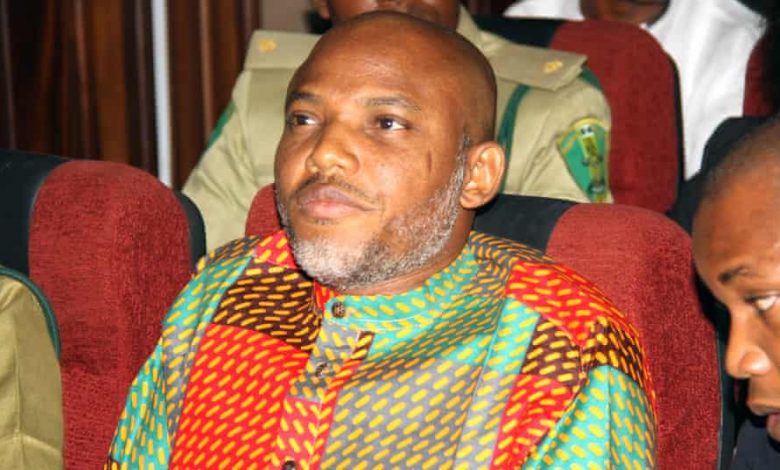Nnamdi Kanu has demanded N25 Billion Compensation from Buhari Government.
Newsonline reports that Nnamdi Kanu, leader of the Indigenous People of Biafra, IPOB, has demanded N25 billion compensation from the Nigerian Government.
Nnamdi Kanu urged a Federal High Court sitting in Umuahia, Abia State, to compel the Federal Government to compensate him with N25 billion over his arrest and repatriation from Kenya.
He explained that the money was compensation for the physical, mental, emotional, psychological, property and other damages he suffered as a result of the infringements on his fundamental rights.
The IPOB leader’s claim was contained in a suit filed before the Court by his Special counsel, Aloy Ejimakor, where he stressed that his arrest in Kenya was illegal.
Ejimakor disclosed that he would be leading a legal team to demand that Justice Evelyn Anyadike-led court enforces Kanu’s fundamental human rights.
A statement by Ejimakor titled: “RE: Nnamdi Kanu approaches Federal High Court, Umuahia to enforce his fundamental rights against unlawful expulsion,” reads partly: “Today (25th March 2022), on behalf of Mazi Nnamdi Kanu, I am leading a team of Lawyers at the first hearing of the Fundamental Rights Enforcement suit I had brought before the Umuahia Division of the Federal High Court. The matter lies before Justice Evelyn Anyadike.
“The Suit is sui generis and primarily aimed at redressing the infamous unlawful expulsion or extraordinary rendition of Nnamdi Kanu, which is a clear violation of his fundamental rights under Article 12(4) of the African Charter on Human and Peoples Rights.
“In addition to the rendition, I am asking the Court to redress the myriad violations that came with the rendition, such as the torture, the unlawful detention and the denial of his right to the fair hearing required by law before anybody is expelled from one country to the other.
“You will recall that on 19th January 2022, the High Court of Abia State determined that portion of violation of Kanu’s fundamental rights that occurred in 2017. Even as I had made claims that bordered on rendition, the Court declined jurisdiction on grounds that rendition, being related to extradition, lies within the exclusive jurisdiction of the Federal High Court.
“So, this instant suit is as a result of my considered decision that a fresh action before the Federal High will be the best route towards addressing this matter of rendition or unlawful expulsion and its legal impacts on the prosecutorial powers of the Nigerian State.
“To be sure, the extraordinary rendition of Nnamdi Kanu triggered legal injuries that cut across multiple jurisdictions both inside Nigeria and abroad. There are now new legal and even diplomatic issues that must be addressed in the United Kingdom, Kenya, the United Nations and the African Union. And within Nigeria, the rendition has expanded the matter far beyond the realms of the trial that lies in Abuja.”
Kanu is seeking the following reliefs:
“A DECLARATION that the arrest of the Applicant in Kenya by the Respondents’ agents without due process of law is arbitrary, and the Respondents’ enforced disappearance of the Applicant for eight (8) days and their refusal to produce the Applicant before a Kenyan Court for the purpose of Applicant’s extradition is illegal, unlawful, unconstitutional and amount to infringement of the Applicant’s fundamental right against arbitrary arrest, to his personal liberty and to fair hearing as enshrined and guaranteed under the pertinent provisions of CFRN and the Charter.
“A DECLARATION that the detention of the Applicant in a non-official secret facility in Kenya and the torture of the Applicant in Kenya by the Respondents’ agents is illegal, unlawful, unconstitutional and amount to infringement of the Applicant’s fundamental right against unlawful detention, torture and to fair hearing, as enshrined and guaranteed under the pertinent provisions of CFRN and the Charter).
“A DECLARATION that, pursuant to Article 12(4) of the Charter, the expulsion (or extraordinary rendition) of the Applicant from Kenya to Nigeria by the Respondents without a decision taken in accordance with the law of Kenya is illegal, unlawful, unconstitutional and amounts to infringement of the Applicant’s fundamental right to fair hearing and not to be expelled from a State Party to the Charter except by virtue of a decision taken in accordance with the law, as enshrined and guaranteed under the pertinent provisions of CFRN and the Charter.
“A DECLARATION that any criminal prosecution of the Applicant the purpose of which the Respondents unlawfully expelled the Applicant from Kenya to Nigeria is illegal, unlawful, unconstitutional and amounts to infringement of the Applicant’s fundamental right to fair hearing, as enshrined and guaranteed under the pertinent provisions of CFRN and the Charter.
“AN ORDER OF INJUNCTION restraining and prohibiting the Respondents from taking any further step in any criminal prosecution of the Applicant enabled by the said unlawful expulsion of the Applicant from Kenya to Nigeria.
“AN ORDER mandating and compelling the Respondents to forthwith restitute or otherwise restore the Applicant to his liberty, same being his state of being as of 19th June, 2021; and to thereupon repatriate the Applicant to his country of lawful domicile (to wit: the United Kingdom) to await the outcome of any formal request the Respondents may file before the competent authorities in Britain for the lawful extradition of the Applicant to Nigeria.
“AN ORDER mandating and compelling the Respondents to issue an official Letter of Apology to the Applicant for the infringement of his fundamental rights; and publication of said Letter of Apology in three (3) national dailies.
“AN ORDER mandating and compelling the Respondents to pay the sum of N25,000,000,000.00 (Twenty-Five Billion Naira) to the Applicant, being monetary damages claimed by the Applicant against the Respondents jointly and severally for the physical, mental, emotional, psychological, property and other damages suffered by the Applicant as a result of the infringements of Applicant’s fundamental rights by the Respondents.”













